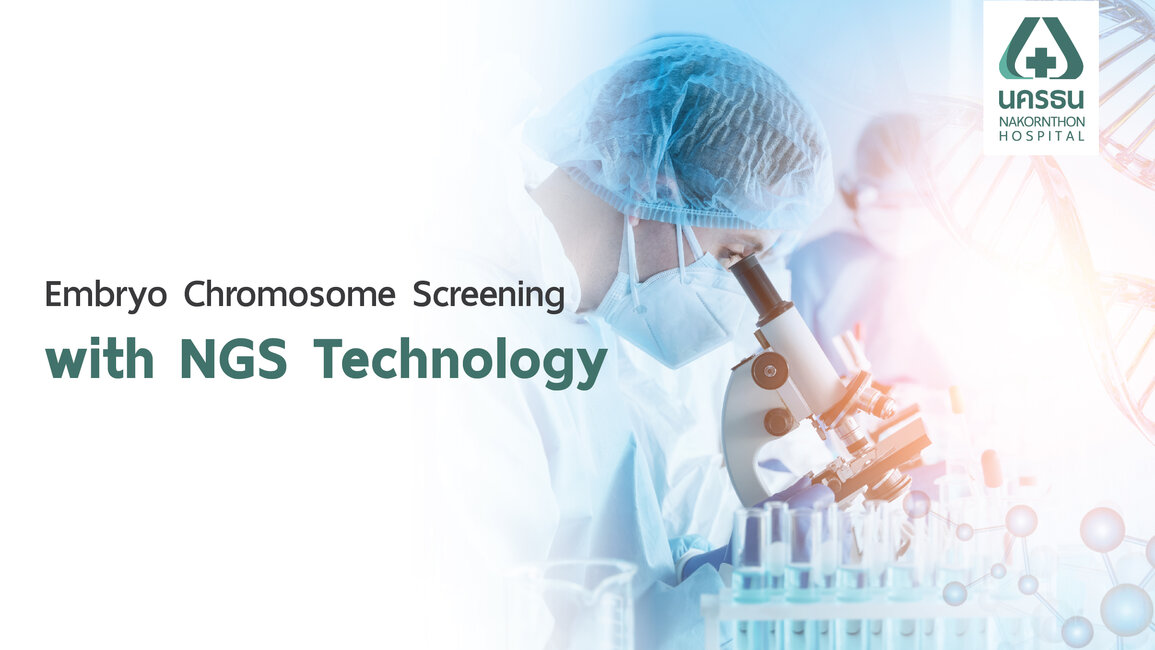Embryo Chromosome Screening Using NGS: A Technique for Detecting Fetal Abnormalities Before Pregnancy
Center : Nakornthon Gift Fertility Center
Article by : Assoc. Prof. Phattaraphum Phopphong

NGS (Next Generation Sequencing) is a technique used to detect abnormalities in genes and chromosomes. It can be utilized to screen embryos created through assisted reproductive technologies, such as in vitro fertilization (IVF), by identifying and excluding embryos with genetic abnormalities before transferring them back into the uterus. This process increases the chances of pregnancy and helps reduce the risk of genetic disorders.
Table of Contents
What Are Genes and Chromosomes (PGT)?
In every human cell, there is the smallest unit known as the “genetic unit” or “gene.” These genes control various physical traits, such as skin color, eye color, body functions, and the development of organs. These genes are arranged in strands that coil into structures called “chromosomes.” Humans have 23 pairs of chromosomes in each cell: the first 22 pairs are responsible for developing the body’s organs, while the 23rd pair determines sex.
Abnormal chromosomes or genes can lead to miscarriage, stillbirth, or congenital disabilities in the child.
Steps for Chromosome Testing of Embryos Using NGS
In the blastocyst stage, or days 5-6 of embryo development, embryologists use special tools to extract about 5-7 cells from an embryo, which contains approximately 50-100 cells, for chromosome testing. After cell extraction, the embryo is frozen while waiting for the test results. Once it is confirmed that the chromosomes are normal, the embryo is selected and transferred back into the uterus.

Benefits of Chromosome Screening of Embryos Using NGS
- Reduces the risk of miscarriage after embryo transfer.
- Decreases the likelihood of congenital disabilities due to chromosomal abnormalities.
- Increases the pregnancy rate from approximately 40% to 60-70% after transferring normal embryos.
- For families with a history of genetic disorders, such as thalassemia, it helps confirm whether the genes are normal.
- Shortens the time required to achieve pregnancy by selecting the highest quality embryos with normal chromosomes.
Who Should Consider Chromosome Screening of Embryos Using NGS
- Couples who have experienced more than two miscarriages due to chromosomal abnormalities or unexplained reasons.
- Couples who have had multiple unsuccessful attempts at assisted reproductive technologies.
- Couples with a family history of genetic disorders or who have previously had children with genetic abnormalities.
- Women over 35 years old who may be at higher risk for genetic abnormalities.
Genetic abnormalities are a significant risk factor that can affect the success of pregnancy from in vitro fertilization (IVF). This includes increasing the chances of conception. Next-generation sequencing (NGS) for embryo chromosomal screening is a technique that helps physicians select embryos for transfer into the uterus, thereby increasing the chances of a successful pregnancy, especially for those who have previously experienced multiple failed IVF treatments.


Assoc. Prof.Phattaraphum Phopphong
Obstertrics and Gynaecology / Reproductive Medicine
Nakornthon Gift Fertility Center
Free Online Consultation
Article of Nakornthon Gift Fertility Center
Infertility: A Common Reproductive Issue That Can Prevent Pregnancy
Embryo Chromosome Screening Using NGS: A Technique for Detecting Fetal Abnormalities Before Pregnancy





